Christianity

Can Tim Tebow do no wrong?
Michael Butterworth of Bowling Green State University has turned his attention to sports media coverage of Tebow, an evangelical Christian and New York Jets quarterback. The author of a forthcoming article in the journal of the National Communication Association, Butterworth talked about how Tebow coverage seldom treads beyond a “nice guy” image to delve into his faith.
Some answers have been edited for length and clarity.

“Sticks and stones can break my bones, but words can never hurt me.”
How many of us grew up with this old adage ringing in our ears? How many of us believe it’s true?
I’ve gone back and forth over the years. I understand that the saying is an invitation to turn our backs on harsh, mean-spirited words thus robbing them of their power, but how many of us are really capable of simply doing that? The truth is words do hurt and sometimes they do more than hurt. Sometimes they are downright destructive and on a large scale.
I think this is what the writer of James is getting at in this morning’s text. Words, the works of our tongues, can be used for good and evil. It is not always easy for us to shape our words and move our tongues in a fashion that serves our faith, our calling as Christians, our work for the reign of God on earth.
One important spiritual discipline, one vital element to our faith formation, then, is learning to tame the tongue. That is, we are challenged to develop custody of our speech in such a way that good news is proclaimed and people are lifted up toward the fulfillment of their creation in the image and likeness of God. Remember, James is especially concerned that we align our words and our work so we both “talk the walk” and “walk the talk.”
If we are offspring of the heavenly parent, if we are made in the likeness of God, how should that shape our speech and control the way we wag our tongues?
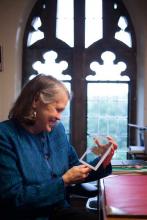
In a surprise announcement that seemed scripted by the novelist Dan Brown, a Harvard professor revealed an ancient scrap of papyrus on Tuesday (Sept. 18) that purports to refer to Jesus' wife.
The so-called "Gospel of Jesus' Wife" presents a dialogue between Jesus and his disciples, said Karen King, a well-respected historian of early Christianity at Harvard Divinity School.
The fourth-century fragment says, "Jesus said to them, 'My wife ...,'" according to King. The rest of the sentence is cut off. The fragment also says "she will be able to be my disciple," according to King.
The discovery that some ancient Christians thought Jesus had a wife could shake up centuries-old Christian traditions, King suggested.
But even King acknowledged that questions remain about the receipt-sized scrap, which contains just 33 words and incomplete sentences. Here are five of the biggest questions.

My friend, Doug, is not what I’d call a religious person. He grew up in church but has since taken to a combination of practicing martial arts, yoga, and independent study, primarily of Buddhist philosophy. In a lot of ways, his journey is a familiar one for younger adults today (he and I are both 40 so we don’t really qualify as “young” adults anymore).
Doug is, like I am, an intellectually curious guy. He follows my work pretty closely, and he is certainly open to other points of view, even if they’re not ones he embraces for his own life. Sometime we share ideas back and forth, but this quote from the Dalai Lama that he sent me recently really got my attention:
"All the world’s major religions, with their emphasis on love, compassion, patience, tolerance, and forgiveness can and do promote inner values. But the reality of the world today is that grounding ethics in religion is no longer adequate. This is why I am increasingly convinced that the time has come to find a way of thinking about spirituality and ethics beyond religion altogether."
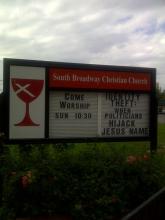
Gotta say I’m a big fan of this church sign at my father-in-law’s church.
It’s time to STOP:
- Using faith, Jesus, and the Bible as a political platform;
- Cherry-picking from the Gospel based on what polls well;
- Claiming Jesus would be so myopic to identify with either of our major political parties;
...

EVER SINCE THE apostles positioned Mary Magdalene as an “unreliable narrator” telling an “idle tale” in Jesus’ resurrection story, some men in the church have claimed maleness as normative and orthodox and femaleness as, well, not.
In the recent case of the Vatican vs. the Leadership Conference of Women Religious (LCWR), the integrity of women’s witness is, once again, called into question by male hierarchs.
These Catholic sisters represent an unbroken, cohesive expression of faith in the history of American Catholicism and in women’s presumption of equality, completeness, and active moral agency both under law and under God—a presumption that is a shining light for women around the world. The sisters might have once shared accolades for faithful servant leadership with their brother priests, bishops, and cardinals, but over the course of nearly 30 years of unfolding pedophilia scandal and blasphemous mob-like cover-up, the laity has learned to look to the sisters alone for examples of Catholic gospel witness and Christian maturity, strength, and just plain grit.
But let’s not sideline this issue as “a Catholic thing.” We don’t get off that easy. The struggle over women’s authority runs right through the denominational diaspora of the body of Christ.
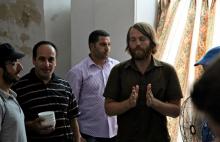
Hebron is known as one of the most volatile cities in the whole region of Israel/Palestine. Located in the heart of the West Bank, both Jews and Arabs have had roots here for thousands of years. Having endured years of conflict, racism, violence and separation, Hebron’s inhabitants have been covered in a narrative lacking an acknowledgment of a shared humanity.
It’s in the middle of such realities that our Learning Community (part of our organization, The Global Immersion Project) feels called to listen, learn, and be radically present. Through the art of friendship making, shared tables and storytelling, we desire to promote the just heart of God by being a people of reconciliation in the way of Jesus.
It was this posture that landed us in the underground home of a local Muslim Palestinian family who is close friends with the Jewish Rabbi who was hosting us in the old city of Hebron (he is both a host and dear friend). Having prepared a beautiful and expansive Palestinian meal, they warmly invited each one of us into their home and said, “Today, this is your home.”
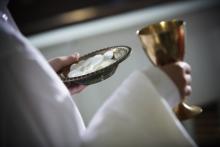
As an ecumenist I listened to (and largely bought) the notion that taking Communion with other Christians in the absence of institutional unity was tantamount to premarital sex, to an intimacy that should not be attempted because we were not — as disagreeing Christians — properly wed to each other yet.
But the more time I spend as a day-to-day trenches brand of pastor living out the faith in the real world, I find this argument holds less and less water.
A reality I have come to grips with after decades of personal ecumenical involvement is the same reality that leaders at the highest levels of churches have been wrestling with for centuries: The age-old pursuit of doctrinal unity under an authoritative “true church” will likely never occur before the Second Coming.
Another reality — a more personal one — has hit me with full force. This division at our Eucharists inflicts pain upon those of tender conscience and deep love for Christ and his bride. They are broken upon the rocks of our divisions and it is a scandal.

I love the Church. I have literally been going to church my whole life — that is, until two months ago.
Then I stopped cold turkey. You can read about it in my post "Walking Away From Church."
Masses of people responded. It astounded me. Most ministers expressed concern saying things like, “My Brother, I am worried that you may be on a dangerous journey,” or, “I fear you may lose your faith.”
Frankly, what I heard them saying was, “Faith is so fragile it needs the Church to enforce it,” which only made me more certain I was making a remarkably healthy spiritual choice.
Former church-going folk frequently told me things like, “There is a large disconnect between the 'Church' of today and the teachings of Jesus,” and “I have found God in a dynamic, deep way and I love God so much more and for real now than when I was unwittingly trying to fit in with my church culture.”
I've been away from church for two months now and I have to say, I am more at peace than I ever have been. My faith is stronger than it ever has been. My family life is healthier than it ever has been. My desire to seek out God and follow the teachings of Jesus is stronger than it ever has been.
I do not want to go back to Church because life outside of Church is better. It just is. There's no dogma complicating the path to God. It is more than refreshing to escape the games church-folk play with the intent of establishing control and “rightness” on their part; it is life-giving to escape it.

Growing up, I heard things at camp and in youth group about how “the world” thought and acted one way, and how “we” were not like that. In fact the world, it seemed, was intent on unraveling everything I valued as good and true, leaving me with a smoldering pile of ideals and beliefs, all dead at the point of a secular sword. It was our job as Christians not only to defend against this frontal attack, but also to fight back in an effort to win souls for the Kingdom.
It was an epic battle, now in its beginning stages, but that would play out as depicted in the fantastical, horrifically violent pages within the Book of Revelation. The end is near; which side will you be on?
The Christianity of my youth was much like the Temple Mount in Jerusalem — a shining jewel high on a hill, beset on all sides by forces intent solely on its destruction. And our mission, as stewards of the faith, was to preserve and maintain the faith, protecting it at all costs. This, I would later learn, was the theological heart of what I now know as the Culture War. And some within the walls of the temple might argue I’ve abandoned the cause, or perhaps switched sides all together.
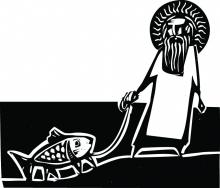
In a recent post here on God's Politics, Derek Flood suggested (as many have lately) that Christian communities need to start taking this whole "faith and science" thing seriously.
I posted some relatively snarky comment on my Facebook page about it (I apologize for the snark) suggesting that the authors of these recent posts about faith and science are ignoring about a century's worth of conversation and theology. Perhaps more.
Let me give you an example of what I mean in Harry Emerson Fosdick.***
As I said just yesterday, Fosdick was famous for lots of things, particularly the sermon "Shall The Fundamentalists Win?" which he preached on May 21, 1922.
It was a call to arms of sorts within the church, encouraging tolerance and a willingness to engage the minds of believers and unbelievers alike in a time of incredible scientific discovery.

I think we’re terrified of failures for the same reasons we’re scared of death, or any type of palpable ending, for that matter. Failure, at its heart, really is a small death. And who wants to go through that if they don’t have to? I’m not saying that we should set ourselves up intentionally to fail, but I get the sense that, more often than not, the fear of the possibility of failure keeps us from really living well. And really when you think about it, if you never fail, you may never figure out where your limits are. What a boring, uninspiring way to live.
So here are some reasons I’ve decided that failure isn’t just inevitable or necessary, but that it’s actually kind of wonderful.

No, this is not some new Charlie Kauffman movie that folds in on itself, creating a perpetual feedback loop. I’m serious; Christians love Top 10 Lists.
No wonder Moses did only 10 commandments.
I noticed this recently when all of the top three most popular articles on the Sojo.net at the time were lists of this kind. So I went back and did a search of my own personal blog archive. Every one of the most popular pieces started with “10 Reasons,” or “Seven Things” or the like.
Are Christians obsessed with lists? What’s the deal?
I talked to a publisher years ago who told me that the key to a successful theology book was to include something akin to “six easy steps” in the title. I never took them up on that advice, but he knew what he was talking about. So after expending a little grey matter on the issue, I came up with this list of reasons why I think Christians love these kinds of lists:
#1. We don’t want to have to think too hard: Now, before you fire up your keyboard and rattle off a protest email, this is a broader truism across our entire culture....
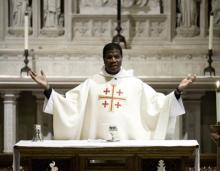
Conservative commentators like Rupert Murdoch's stable and Ross Douthat of The New York Times are feasting on what they perceive as the "death" of "liberal Christianity."
They add two and two and get eight. They see decisions they don't like — such as the Episcopal Church's recent endorsement of a rite for blessing same-sex unions. They see declines in church membership. They pounce.
Such "liberal" decisions are destroying the church, they say, and alienating young adults they must reach in order to survive.
Never mind that surveys of young adults in America show attitudes toward sexuality that are far more liberal than those of older generations. Never mind that conservative denominations are also in decline.
Never mind — the most inconvenient truth — that mainline denominations began to decline in 1965, not because of liberal theology, but because the world around them changed and they refused to change with it.

In recent days, conservatives have attacked the Episcopal Church. The reason? The church has just concluded its once every three-year national meeting, and in this gathering the denomination affirmed a liturgy to bless same-sex unions. Conservatives assert that the Episcopal Church's ever-increasing social and political progressivism has led to a precipitous membership decline and ruined the denomination.
Many of the criticisms were mean-spirited or partisan, continuing a decade-long internal debate about the Episcopal Church's future. However, New York Times columnist Ross Douthat broadened the discussion, moving beyond inside-baseball ecclesial politics to ask a larger question: "Can Liberal Christianity be Saved?"
The question is a good one, for the liberal Christian tradition is an important part of American culture, from dazzling literary and intellectual achievements to great social reform movements. Mr. Douthat recognizes these contributions and rightly praises this aspect of liberal Christianity as "an immensely positive force in our national life."
Despite this history, however, Mr. Douthat insists that any denomination committed to contemporary liberalism will ultimately collapse. According to him, the Episcopal Church and its allegedly trendy faith, a faith that varies from a more worthy form of classical liberalism, is facing imminent death.

Is the Mainline Liberal Church in decline? Numerically, sure. Absolutely. But what this means, I cannot say. Many have tried to make sense of it. In the wake of recent editorials, some theologians and others have offered up their thoughts. I surmised it might be helpful to collect one or two of the links here on the outside chance that you missed them.
Can Liberal Christianity Be Saved - Ross Douthat offers some sharp critiques of the tradition. Once the bastion of the Social Gospel movement, the liberal mainline is not all "social" and very little "Gospel."
"But if conservative Christianity has often been compromised, liberal Christianity has simply collapsed. Practically every denomination — Methodist, Lutheran, Presbyterian — that has tried to adapt itself to contemporary liberal values has seen an Episcopal-style plunge in church attendance. Within the Catholic Church, too, the most progressive-minded religious orders have often failed to generate the vocations necessary to sustain themselves."
There have been a couple of good direct responses to Douthat's OpEd piece.

Rather than mine being a theology of “Jesus died for your sin,” mine is one of “Thy Kingdom come.” That is archaic language, and I find that a little off-putting, yes, but given that it’s from the Lord’s Prayer, attributed to Jesus, I think it’s worth wrestling with. Basically, I share the interpretation of this line of the prayer with many seekers of social justice, like MLK, Walter Rauschenbusch and the like, who believe that the line, “Thy Kingdom come, Thy will be done, on earth as it is in heaven,” is an expression of longing, for God’s love to be fully realized, for our inequities and brokenness to be reconciled here on this earth, and not just some day after we die.
This is not likely something at which we will entirely arrive in this life, but it is something toward which we should re-orient ourselves daily, in order to seek it out, actively and vocally, in all we do. This, I believe, is Christ’s call to the world.

A common rationalization those in religious circles make for cutting social programs that help the poor is that church should be the one helping “the least of these,” not the government. But if we know that’s not possible given the church’s means, that millions will get left behind because our efforts fall far too short, is that still a logical line of defense? Jesus told us to care for the poor, sick, and vulnerable—he didn’t prescribe how.
Sometimes Jesus healed people one-on-one. Sometimes he addressed the needs of a multitude by providing enough food to feed them all. Sometimes he sent others in his stead to provide healing.
If we ignore the needy in our midst by getting rid of one huge way to address that need, we are not following Jesus’ example.

I have a confession.
(That's rich, right? A minister confessing.)
I have a hard time telling people I'm a minister. Yes, really. I actually tend to handle it this way:
Person: “So, what do you do for a living?”
Me: “I'm a minister... (appropriate pause)... but not the kind you just pictured in your head.”
Sad, I know.
Honestly though, it's worse than that. I'm even very resistant to calling myself a “Christian.” And I'm not even close to the only Christian who feels that way! It's so bad that I have this very conversation with people all the time. There seems to be some kind of “Believer-like-me Radar” which tells people it's safe to talk to me about not liking the“C” word — CHRISTIANITY.
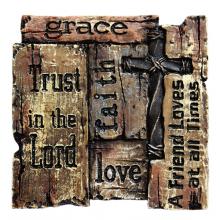
This is the final in a four-part series on the overused (and often insensitively employed) phrases that plague the Christian lexicon. Though I felt like I was offering some insight into what to do instead of offering these cliches, some asked for more specificity or clarity. So in that spirit, I thought I’d offer a final list of things to do rather than pop off with these phrases that may mean little or nothing to the recipient, or worse, may cause unintended – but lasting – harm.
Read article one in the series here: Ten Cliches Christians Should Never Use
Read article two in the series here: Ten More Cliches Christians Should Avoid
Read article three in the series here: Nine (Final) Christian Cliches to Avoid
Now, Ten Antidotes to Christian Cliches.